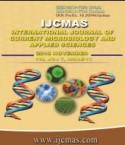


 National Academy of Agricultural Sciences (NAAS)
National Academy of Agricultural Sciences (NAAS)

|
PRINT ISSN : 2319-7692
Online ISSN : 2319-7706 Issues : 12 per year Publisher : Excellent Publishers Email : editorijcmas@gmail.com / submit@ijcmas.com Editor-in-chief: Dr.M.Prakash Index Copernicus ICV 2018: 95.39 NAAS RATING 2020: 5.38 |
Krishi Vigyan Kendras – KVKs (Farm Science Centres) had been established by Indian council of Agricultural Research (at present there are 695 KVKs under XI ATARIs). Imparting vocational trainings for entrepreneurship development for women, rural youth and farmers is one of the mandate of KVKs. The present study was conducted on evaluating the effectiveness of vocational trainings on Mushroom cultivation held at Krishi Vigyan Kendra (KVK), Utukur conducted which is needed for further improvement in their standard. A structured interview schedule consisting of statements related to their socio economic profile. Formative evaluation was done by taking reaction and knowledge test to get outcome of the training. Summative evaluation was conducted to know the adoption status of mushroom cultivation enterprise by the trainees, the problems faced by them in adoption of this enterprise and economic impact of adoption growers. A typical trainee was a young, married, educated, low annual income, from nuclear family and non-agricultural and urban background, have no experience in mushroom farming and are highly participating through mass media are keen to adopt mushroom cultivation for additional income. Reaction of trainee regarding various aspects of teaching- learning situations of the training programmes viz., trainer, subject matter, teaching material and physical facilities was taken. It was understood that the teaching material should be improved with photographs where ever necessary and colour printout of booklet can be supplied. Also, it was identified that, prior to the training, the trainees were less aware with respect to their knowledge and understanding about the mushroom cultivation aspects. But after the training, there is significant increase in the knowledge level of trainees. All the trainees had positive change in the level of knowledge after the training. Adoption status of mushroom cultivation was studied to know the impact of vocational training programmes. It is indicated that 80 percent of the trainees had adopted mushroom cultivation enterprise and various problems faced by mushroom growers were Non remunerative price (42%), Non availability/ poor quality of spawn (38%) lack of proper infrastructure (20%). About 45 % of continued adopters had increased their family income by 60-80% followed by 30% of continued adopters had increased their family income by 5-10%. Further, it was confirmed that mass media played major role in facilitating the information regarding imparting of vocational training based on the feedback of trainees.
 |
 |
 |
 |
 |